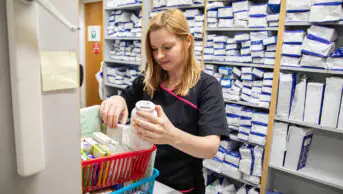
Alamy/Shutterstock.com/Science Photo Library
In this end-of-year blog, the learning team at The Pharmaceutical Journal review a range of contributions made by our expert authors, showcasing some of their highlights from the year.
The year in numbers

Shutterstock.com/The Pharmaceutical Journal
Mental health
Demand for mental health services has increased dramatically following the COVID-19 pandemic, with frontline pharmacists helping to identify patients with mental health conditions, referring patients appropriately and providing support and advice for those requiring pharmacological and non-pharmacological interventions. In 2023, we published a range of mental health articles, including on anxiety in children, emotional wellbeing of children and young people with diabetes, eating disorders, self-harm and poisonings.
Adding a few simple screening questions to your arsenal and familiarising yourself with local referral pathways can make such a difference
Aisling Molloy, specialist mental health pharmacist and clinical account manager at First Databank
One of our most read articles of the year was a CPD module on depression in adults, written by Aisling Molloy, who is a specialist mental health pharmacist and a clinical account manager at First Databank. The article was written in response to revised National Institute for Health and Care Excellence (NICE) guidance issued in June 2022. When asked about her motivation for writing the article, Molloy said: “This article was important for me to write because depression is such a common illness and has a negative impact on the management of most long-term conditions, yet it’s highly treatable in the early stages with prompt intervention … Adding a few simple screening questions to your arsenal and familiarising yourself with local referral pathways can make such a difference — not only for your patients but also your family, friends and colleagues. It may even help you one day.”
We have also developed resources for optimising and tapering antidepressant use, including articles on how to safely switch antidepressants and a practical case-based guide to hyperbolic tapering when reducing and stopping their use.
Our authors have also explored fundamental mental health research questions through review articles on the genetic basis of mental health and the role of pharmacogenomics, and whether or not there is a link between antihypertensive medicines and depression. Work is also currently underway on a new digital ‘hub’ on the PJ website for mental health, which will pull together our full range of resources into one simple-to-use collection. Watch out for this early in 2024.
Clinical pharmacy and independent prescribing
Another theme of 2023 has been the development of resources to support the continued evolution of the pharmacy profession and the expansion of pharmacist prescribing. The Pharmaceutical Journal organised a roundtable event, held in July, that brought together important stakeholders from across pharmacy to discuss and identify potential ways to support the new cohort of pharmacists who will join the register in 2026 as pharmacist prescribers. We were also excited to recently launch the first phase of a new collection of learning resources mapped to the Royal Pharmaceutical Society’s competency framework for all prescribers. This collection is set to steadily expand throughout 2024.
Medicine optimisation and reconciliation
Our professional skills articles have also looked to support the changing nature of the pharmacist role, with articles published on topics including multidisciplinary team working, providing effective health education and advice for setting up new services. Laura Buckley, who is a specialist clinical pharmacist at Humber Primary Care, authored an article outlining how to conduct a clinical review of a patient’s medicines, which went on to be one of our most widely read pieces of the year. Gareth Nickless, lead clinical liaison tutor at Liverpool John Moores University, also authored a detailed ‘how to’ guide on medicines reconciliation — a crucial process, which helps to safeguard patients and promote smooth transitions between services and care settings.
Performing medicines reconciliation accurately and promptly is an essential part of ensuring patient safety, and pharmacists’ expertise in medicines enables them to lead on this initiative
Gareth Nickless, lead clinical liaison tutor at Liverpool John Moores University
Reflecting on his primary aims for the article, Nickless said: “The main point I would like readers to take away from this article is to appreciate the strengths and limitations of the different sources that can be used to obtain a medication history and that, for some patients, you may need to use three or four sources to triangulate the information. Performing medicines reconciliation accurately and promptly is an essential part of ensuring patient safety, and pharmacists’ expertise in medicines enables them to lead on this initiative.”
Further development of the PJ learning resources
We have also taken steps to improve the way resources are organised on the PJ website and to develop content that utilises the full benefits of online learning. We launched new subject collections for prescribing, paediatrics, minor ailments, and women’s health; incorporated self-assessment questions in articles to help readers consolidate learning; created interactive graphics and animations to bring visual subjects to life; and developed a new range of quizzes to allow readers to audit their level of knowledge on different areas of practice. A further highlight has been the continued development of the PJ Pod, with research and learning episodes exploring wide-ranging topics, including hormone replacement shortages, deprescribing and the impact bruton tyrosine kinase inhibitors have had on cancer care.
Finally, we would like to extend our thanks to all of our authors and reviewers for their ongoing support and expertise. We have much more planned for 2024 and are looking forward to making further improvements to the way readers can engage with our resources.
If you have any suggestions for topics that you would like to see us cover or if you would like to be kept informed about writing opportunities, please do get in touch with a member of the team. We would be delighted to hear from you.
Alex Clabburn, senior editor: alex.clabburn@rpharms.com
Caitlin Killen, assistant clinical editor: caitlin.killen@rpharms.com
Katherine Sole, editor: katherine.sole@rpharms.com
Michael Dowdall, executive editor: michael.dowdall@rpharms.com

